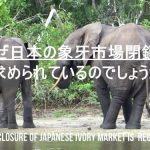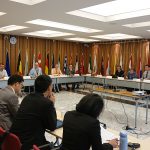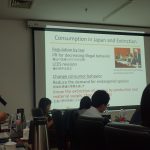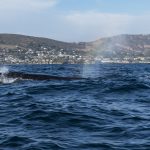New page ”Sharks and CITES”
A new web page has been set up to record the Symposium“:To know the world of sharks– Endangered shark species”. You can watch the lectures of videos. Why a quarter of the world’s 500 sharks are threatened with extinction,? why CITES is effective in protecting sharks? Why did shark fins head for demand decline in Hong Kong? What is the position of the Japanese government in the treaty? Click here
CLOSE YOUR IVORY MARKETS
JWCS has participated in this campaign for the closure of the Ivory Domestic Market, aimed at CITES CoP18 in August. Tens of thousands of elephants are slaughtered every year for their tusks. From 2007 to 2014, 144,000 elephants were killed across Africa, an elephant every 15 minutes of every single day. This is fuelled by the demand for ivory across the world, including Japan, but also shockingly the EU. Against overwhelming public opinion, the EU commission still refuse to ban the ivory trade within the EU. Furthermore, they are planning to reject steps to award elephants the greatest possible protection at an upcoming wildlife trade conference next month. Help us […]
G20 – Celebrities and NGOs calling for an immediate end to all commercial whaling
On June 29, Celebrities and NGOs from participating countries submitted an open letter for the end of all commercial whaling to the leaders of each country participating in the G20 Osaka Summit. The Japanese government has left the IWC on June 30, and has announced the resumption of commercial whaling in territorial waters and EEZ from July 1. JWCS has also joined this open letter.
Exchange with EU and Japanese NGO in Biodiversity Issues
At the invitation of the IUCN Japan Committee on May 17, 2019, an exchange of views was held between CBD officials from EU and EU member countries and the Japanese NGO. The theme is Post2020, the goal for the period after the Aichi Target on Biological Diversity. Post2020 is at the stage of involving various stakeholders and exchanging views, with the aim of being adopted by the Parties Conference to be held in China in 2020. This discussion meeting is one of the efforts.
The 3rd tripartite meeting of IUCN members of China, Japan and Korea
IUCN members of China, Japan and Korea meet in Beijing, China September 7-9 2018. JWCS participated the 3rd tripartite meeting, followed the 2rd tripartite meeting. Members primarily discussed; How to cooperate with ARO and commissions to promote IUCN programs, and what the post 2020 biodiversity conservation framework looks like. The JWCS Secretary-General presentation presented our works on meeting.
The revised law on conservation of endangered wild animals and plants
Under the revised Act on Conservation of Endangered Species of Wild Fauna and Flora has set take off effect since 1st June 2018. Live individuals: The operation of amendment of Act on Conservation of Endangered Species of Wild Fauna and Flora A validity period of 5 years was established for the registration. Registration card must be transferred together with an individual organism listed in CITES Annex I when it is transferred or delivered. There were some case of young pet animals sold as “pre-regulation”.This means that it was owned before listed in Annex I. It is getting important on how to distinguish age of popular pet animals. There are several laws related […]
News report on the catch of glass eels and its import
CITES CoP 17 decided to investigate whether it is sustainable trade also for non-listed eel species (Dec 17.186-189). The Japanese eel is a non-listed species, however the catch have been drastically decreasing,and Japan imports glass eels for aquaculture. “News report on the catch of glass eels and its import” Yasuhiro SANADA Original(Japanese) http://y-sanada.blog.so-net.ne.jp/2018-04-07
Comply with CITES and Stop Distributing Sei Whale Meat
Joint Statement NGOs call on Japanese Government to: Comply with CITES and Stop Distributing Sei Whale Meat At the Standing Committee of the Convention on International Trade in Endangered Species of Wild Fauna and Flora (CITES) in October 2017, the Japanese government was questioned about the legality of bringing specimens of sei whale from the sea (“introduction from the sea” defined by CITES). Japanese NGOs urged the Japanese government to comply with CITES and stop distributing sei whale meat.









